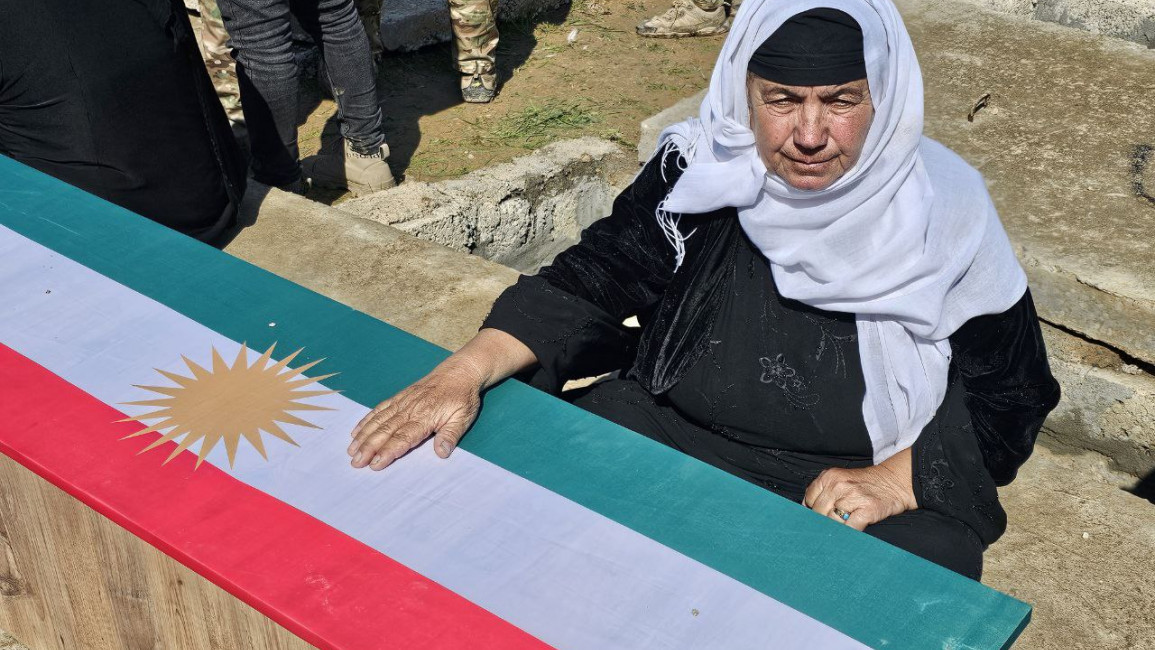172 victims of 'Anfal genocide' laid to rest in Iraqi Kurdistan
On Wednesday, the remains of 172 victims of what many are calling the "Kurdish Anfal genocide" were finally buried at the Anfal Monument cemetery in Sulaimaniyah's Chamchamal district in the Iraqi Kurdistan region. These remains were previously kept at a forensic medicine facility in Baghdad for over four years.
Four mass graves, including hundreds of bodies believed to be Kurds killed by Saddam Hussein's regime, were found in July 2019 in the Samawa desert of the al-Muthanna province of southern Iraq.
Samawah is located approximately 280 kilometres (174 miles) southeast of Baghdad. It serves as the contemporary capital of the Al Muthanna Governorate.
Iraq's First Lady Shanaz Ibrahim Ahmed initiated the return of the remains to the Kurdistan region in cooperation with Iraq's Association for Martyrs and Mass Graves, as well as the Anfal Monument Cemetery. She addressed the attendees at the ceremony and called on Iraq's federal government, as well as the Kurdistan Regional Government (KRG), to seriously recognise the genocide against the Kurdish people and work together to compensate the relatives of the Anfal victims financially and morally.
Habil Haji Ahmed, director of the Anfal Monument Cemetery, told The New Arab that Iraqi identities found with the 172 remnants in the Samawa desert proved they were women and children from the Aghjalar area of Chamchamal. Thus, they were buried at the cemetery.
He also said that specialised medical teams have been taking blood samples from more than 3,400 relatives and families of the victims to conduct DNA tests for them to identify the deceased. He said the process would continue and disclosing test results would take time.
In 1987 and 1988, as the Iraq-Iran war was winding down, Saddam Hussein's regime launched a massive military campaign in Anfal against Kurdish villagers who were supportive of the various Kurdish peshmerga rebels. Consequently, between 50,000 and almost 200,000 people were killed, including women, children and the elderly, many of whom were buried in mass graves across the southern deserts of Iraq.
The town of Chamchamal, where most remaining survivors and families of Anfal victims live, includes the largest gas oil fields in Iraq, but locals blame the Kurdish authorities for the lack of essential services.
In 2007, the Iraqi High Tribunal Court declared the campaign a genocide, issuing a decision for the arrest of 460 suspects during the Anfal trials, including 258 Kurdish mercenaries.
So far, no one has been arrested by the Iraqi or Kurdistan Regional Government (KRG) authorities. Relatives of Anfal's victims say their basic demands are bringing those Kurdish mercenaries to justice, receiving compensation for these crimes, and receiving public services.
Speaking to the reporters at the ceremony, Chato Salih, the KRG deputy minister of interior, said the demand of the Anfal relatives for bringing the Kurdish mercenaries to justice is "legitimate".
Haval Abu Bakr, governor of Sulaimaniyah, during another press conference at the ceremony, said in response to questions by TNA, "The justice ministry and the general attorney in the Kurdistan region and Iraq should seriously work on this case for the Anfal to be internationally recognised as genocide and all those who were involved to be held accountable."
Qasim Kazim Hama Ali, whose father was one of the victims, told TNA, "After waiting for 36 years, today we buried our beloved ones, including my late father and uncle. I feel calm now because we have waited nearly five years for these remains to be returned to the Kurdistan region. I appreciate Iraq's First Lady's initiative in serving the Anfal case."
The KRG Minister of Martyrs and Anfal Affairs, Abdulla Haji Mahmoud from the Kurdistan Socialist Democratic Party, did not attend Wednesday's ceremony. Hama Ali criticised the minister for being absent at the ceremony and rendered his absence for an incident that happened during the 34th anniversary commemorating the Anfal massacre on 14 April 2022 when some relatives of Anfal expelled him from the commemoration.
"I tell the KRG Minister of Martyrs and Anfal Affairs, you are not our minister and could not shoulder your responsibility by being absent today in this ceremony," Hama Ali said. "All the families of Anfal say his absence was due to the incident in 2022; he had to be here today. Those who directed their fury toward the minister in 2022 do not represent all relatives of Anfal victims. Thus, the minister had to shoulder his responsibility beyond any personal hatred towards anyone."
Muhammed Mullah Nuri, another relative of one of the victims and a Muslim preacher, said to TNA, "Saddam Hussein's regime had committed big atrocities against the Kurdish people by labelling them as infidels and misusing the sacred Qur'anic texts against Anfal for his genocidal campaign."
While expressing relief that the victims received a burial, he further stressed that the KRG does not provide basic public services, including clean drinking water during the hot summer season. He also argued that the reason that the Kurdish authorities are not taking legal measures against the Kurdish mercenaries is that during the 1991 Kurdish uprising against Hussein's regime, the Kurdish parties pardoned all Kurdish mercenaries aiding Hussein's regime.



![President Pezeshkian has denounced Israel's attacks on Lebanon [Getty]](/sites/default/files/styles/image_684x385/public/2173482924.jpeg?h=a5f2f23a&itok=q3evVtko)



 Follow the Middle East's top stories in English at The New Arab on Google News
Follow the Middle East's top stories in English at The New Arab on Google News


